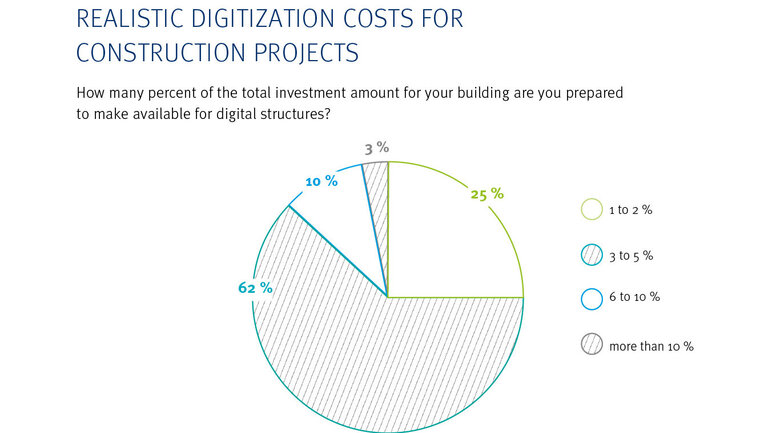At this year’s Expo Vision, the top players from different regions of Germany – from Aachen, Bremen and Berlin to Hamburg and Munich – again met to discuss the topic of digitization in the real estate sector. The consultants, investors, politicians, real estate experts, and representatives of different sectors from all over the country, agreed that the future of the construction and real estate industry lies mainly in digital technology. However, they also established that in reality most construction projects today are still largely run by the same analog processes as ever.
Continued Reluctance to Invest
One of the central findings of the survey was that almost two out of every three participants at the event said their company’s annual investment in digitization was 1 to 5 percent of turnover. For 27 percent, the level of investment was 6 to 10 percent. More than one in ten stated that their company invests more than 10 percent of its turnover in digital transformation. These figures prove the sector is increasingly recognizing the potential of digitization, although compared with the frontrunners in the automotive or electronics sectors, companies in the real estate sector are only slowly coming around to investing in digitization.
Realistic Digitization Costs for Construction Projects
For specific new building or conversion projects, every fourth survey participant is prepared to make available 1 to 2 percent of the total investment amount for digital structures in the building. Two-thirds consider 3 to 5 percent in additional digitization costs acceptable. One in ten is in favor of investing as much as 6 to 10 percent. The majority quote realistic amounts. According to Steffen Szeidl, Member of the Executive Board of Drees & Sommer, the additional costs of digitization currently amount to approximately 3 to 5 percent of the total investment. He explained: ‘A digitization concept must be a given, in the same way that energy and sustainability concepts are. If digital structures and processes are not planned and properly developed long before construction begins, the result can be a lot of costly and time-consuming extra work.’
Increased User Demands as a Stimulus for Innovation
The main driver of investment in the digitization of buildings is increased user demands. Well over half of those surveyed are prepared to take steps towards digitization for this reason. Every second survey participant expects digitization to lead to more efficient processes, and more than 40 percent see digitization as an opportunity for new business models, greater efficiency and reduced costs.
As far as new methods or business models are concerned, there is a simple but very important principle, according to Steffen Szeidl: ‘The focus must always be on people and their needs. Digital technologies will only gain acceptance when they are of real benefits for investors, clients and users of buildings, and if they pick up on their future expectations in a sustainable and user-friendly way. Digital transformation, sustainability and analog expertise must go hand in hand.’
Obstacles: From the Real Estate Boom to Fear of Cybercrime
On the other hand, the real estate boom is precisely what leads many companies to underestimate the investment pressure caused by digital transformation. But fear is also a barrier to companies’ willingness to invest: significantly more than half of those surveyed fear that digitized buildings do not provide sufficient protection against attacks from hackers. The lack of uniform standards, inadequate data protection and the shortage of skills in planning, constructing and operating smart buildings also make potential investors hesitate.
Digital Frontrunners
All sectors are affected by digital transformation. However the rates at which the individual sectors are pressing ahead with digitization differ – and that includes their properties. The automotive industry is the frontrunner in this respect, according to two-thirds of those surveyed. Almost half also consider buildings in the ICT sector to be far more advanced than those in other sectors. Logistics buildings are seen as digital trailblazers by 43 percent.
